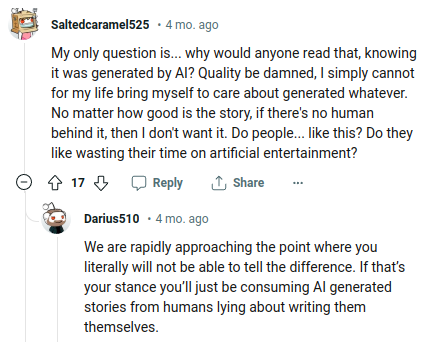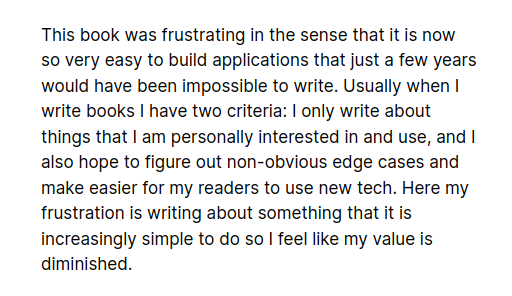I have just realized that Il Post released part of an interview I gave on the topic of vibe coding a few months ago (article in Italian). I have many problems with the term Vibe Coding, but I suspect the expression will gradually fade, and it will return to being just “coding”, like wireless phones …
Tag: AI
Take the time to go through this
I think this music video majestically wraps up the creative zeitgeist of the second half of 2025. Source
A mismatch between the problem that a system developed to solve and the task that it is given can have significant consequences. Just as the human drive to obtain sweet and fatty foods can be maladaptive in a world where those foods are easily available, the autoregressive tendencies of LLMs can cause problems when they are given a task that is not next-word prediction.
Embers of autoregression show how large language models are shaped by the problem they are trained to solve
I love it that the junk_food / information_diet metaphor can also be applied in reverse, where the entities feeding on the wrong stuff are machines and not humans.
https://docs.cozodb.org/en/latest/releases/v0.6.html
This was an interesting read.
Today’s incarnation of GPTs is nothing more than a collective subconscious: different prompts will elicit different personalities and responses from them.
Private memory and individual fine-tuning of model weights according to private experience are of course required, but we need more than that. One hangover from the era of Big Data is the belief that all data must be preserved for later use. The reality is that we just get a bigger and bigger pile of rubbish that is harder and harder to make sense of. Humans don’t do this. When awake, humans remember and reason, but when dreaming, humans distill, discard, and connect higher concepts together. Random-walking LLMs on proximity graphs can do this, and the constraints are no longer measured in gigabytes but instead in minutes (hours) and joules (calories). AI also needs to rest, reflect, and sleep, after all.
Ziyang Hu
Releasing Stream of Consciousness

Warning: this post makes extensive use of unprofessional anthropomorphization. Today I’m releasing a new project called Stream of Consciousness. It’s a website where you can read the thoughts of Livia Pacifica, an imaginary person powered by Large Language Models, vector databases, and plain old storytelling. Livia is a digital artist. She uses text-to-image models to …
Replace a fine-tuned text-davinci-003 with Mixtral 8x7B
In a few short hours, OpenAI will shut down access to a few old large language models, the text-davinci series. Everyone who depended for some project on a fine-tuned version of these models and who hasn’t found a replacement yet might soon feel some pain. I was in that cohort until I found out how …
AI and creativity, an interview with Kevin Donnellan
Kevin Donnellan from Explainable was kind enough to interview me with some very interesting questions. Here’s the full interview: First off, The Infinite Conversation. What first sparked the idea, why Herzog and Žižek? And could you talk through how practically you set it up? I wrote extensively about how the idea came about in this article. …
Encroaching Doom pt. 1

Encroaching Doom pt. 2

“Take a deep breath and work on this problem step-by-step.”